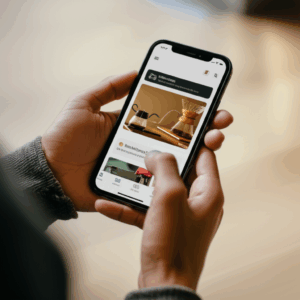The digital age has ushered in an era of unprecedented access to health and fitness information. Millions are now tracking their activity levels, calorie intake, and sleep patterns through various apps readily available on their smartphones. While these fitness apps are often marketed as tools to improve health and well-being, a growing body of research suggests a concerning link between their use and the development or exacerbation of disordered eating habits.
The Allure of Tracking: A Double-Edged Sword?
Approximately 69% of adults track health indicators using technology. The appeal of these apps is undeniable. They offer a sense of control, provide immediate feedback on progress, and can be highly motivating for those seeking to adopt healthier lifestyles. Many apps gamify the experience with rewards and social sharing, further encouraging engagement. A meta-analysis of 41 studies even found that users of mobile fitness apps experienced a significant drop in their average body mass index (BMI) compared to those who didn’t.
However, this focus on quantification can be a slippery slope, especially for vulnerable individuals. Mental health experts are increasingly concerned that the constant tracking of numbers like weight, calories, and steps can lead to an unhealthy obsession with these metrics, overshadowing overall wellness. This can induce rigid, inflexible thinking regarding health, diet, and exercise. Focusing on metrics such as calories provides an oversimplified outlook towards health and can encourage perfectionist “all-or-nothing” mindsets.
Disordered Eating: When Tracking Goes Too Far
Disordered eating encompasses a range of unhealthy eating behaviors and attitudes. It doesn’t necessarily meet the full diagnostic criteria for a clinical eating disorder like anorexia or bulimia, but it can still significantly impact a person’s physical and mental health. These behaviors can include:
- Restrictive dieting: Severely limiting calorie intake or cutting out entire food groups.
- Obsessive calorie counting: Meticulously tracking every calorie consumed and burned.
- Excessive exercise: Engaging in extreme amounts of physical activity to burn calories or change body shape.
- Body image concerns: Experiencing intense dissatisfaction with one’s appearance.
- Binge eating: Consuming large amounts of food in a short period, often accompanied by feelings of loss of control.
- Purging behaviors: Engaging in activities like self-induced vomiting, laxative abuse, or excessive exercise to compensate for food intake.
Research indicates a correlation between the habitual use of diet and fitness apps and a notable increase in problematic eating habits and an obsession with calorie management, particularly among young adults. Young adults who frequently utilize these applications exhibited significantly greater signs of harmful dieting practices and negative body image perceptions than those who refrained from using such tools.
The Vulnerable User: Who is Most at Risk?
While anyone can potentially develop unhealthy habits related to fitness app use, certain populations are particularly vulnerable. Studies show that fitness apps are most popular among college-educated women ages 18-29, a demographic also susceptible to disordered eating. Individuals with pre-existing symptoms of eating disorders are more likely to use fitness tracking apps.
Several factors contribute to this increased risk:
- Pre-existing body image concerns: People who are already dissatisfied with their bodies may turn to fitness apps as a way to achieve an “ideal” physique.
- Perfectionistic tendencies: The focus on numbers and goals can be particularly appealing to those with perfectionistic personalities, who may become overly fixated on achieving specific targets.
- History of dieting: Individuals with a history of restrictive dieting may be more likely to use fitness apps to monitor and control their food intake.
- Social comparison: Many fitness apps include social features that allow users to compare their progress with others. This can lead to feelings of inadequacy and fuel body image concerns.
People who report using fitness apps primarily for weight control or body image reasons rather than health reasons are significantly more likely to experience symptoms of eating disorders. A survey reported that approximately 93% of people primarily use fitness tracking apps for weight/body image reasons.
How Fitness Apps Can Exacerbate Disordered Eating
Fitness apps can exacerbate disordered eating in several ways:
Fixation on Numbers
Diet and fitness apps trigger and exacerbate symptoms by focusing heavily on quantification, promoting overuse and providing certain types of feedback. The emphasis on calories, steps, and weight can lead to an unhealthy fixation on these numbers, turning health into a game of metrics rather than a holistic pursuit.
Rigid Dieting
The focus on dietary restriction and weight-loss in these apps may feed into restrictive or excessive behaviors raising concerns for those people who have pre-existing concerns about their weight or body image. Users may feel compelled to adhere to strict dietary rules, cutting out entire food groups or severely limiting their calorie intake in an attempt to meet app-defined goals.
Obsession
The constant tracking and monitoring can lead to an all-consuming obsession with food and exercise, leaving little room for other aspects of life. The user may find themselves constantly thinking about their next workout or meal, neglecting social activities, work, or school.
App Dependency
Users may become overly reliant on the app to guide their eating and exercise habits, losing touch with their own body’s signals of hunger, fullness, and fatigue. This dependency can make it difficult to maintain a healthy relationship with food and exercise in the long term.
Extreme Emotions
Participants reported that diet and fitness apps trigger and exacerbate symptoms by focusing heavily on quantification, promoting overuse and providing certain types of feedback. The pressure to meet goals can lead to feelings of guilt, shame, and anxiety when targets are not met. Conversely, achieving goals can trigger a sense of euphoria and validation, further reinforcing the addictive nature of the app.
Social Comparison and Body Image
Exposure to idealized bodies in the media has been shown to increase body dissatisfaction among women. One of the mechanisms through which exposure influences body dissatisfaction is appearance-based comparison with the people in the images. Upward social comparison may discourage users from exercise training, lead to body anxiety and lower self-esteem.
The “Techorexia” Phenomenon
The compulsive behavior normalized by the popularity of health technology is sometimes referred to as “‘Techorexia'”. For those with tendencies toward orthorexia or anorexia, fitness apps provide a semi-concealed means to legitimize and camouflage unhealthily restrictive or obsessive behaviors under the guise of “clean eating” and concrete goal-setting.
Moving Forward: A Call for Responsible App Design
Given the potential risks associated with fitness app use, there is a growing need for responsible app design and a shift in how these tools are marketed and used.
Emphasis on Holistic Health
Apps should focus on promoting overall well-being rather than solely emphasizing weight loss or calorie counting. This includes incorporating features that encourage mindful eating, stress management, and positive body image.
Personalized Goals and Feedback
Apps should provide personalized goals and feedback that take into account individual needs, preferences, and health conditions. Generic, one-size-fits-all approaches can be detrimental to those with pre-existing vulnerabilities.
Promotion of Body Positivity
Apps should promote body positivity and discourage social comparison. This can be achieved by removing features that allow users to compare their progress with others or by incorporating messages that celebrate diversity and individual differences.
Education and Awareness
Users need to be educated about the potential risks associated with fitness app use and encouraged to be mindful of their behaviors and attitudes. Apps can include disclaimers and resources that provide information about disordered eating and promote healthy habits.
Professional Guidance
For individuals with a history of disordered eating or body image concerns, it is essential to seek guidance from a qualified healthcare professional before using fitness apps. A therapist, registered dietitian, or other specialist can help individuals develop a healthy relationship with food and exercise and monitor their progress.
Conclusion: Using Technology Mindfully
Fitness apps have the potential to be valuable tools for promoting health and well-being. However, it is crucial to be aware of the potential risks associated with their use, particularly for vulnerable individuals. By using these apps mindfully, setting realistic goals, and focusing on overall well-being rather than solely on numbers, individuals can harness the power of technology to improve their health without jeopardizing their mental health. The key is to find a balanced approach where physical health promotion synchronizes with mental well-being.







